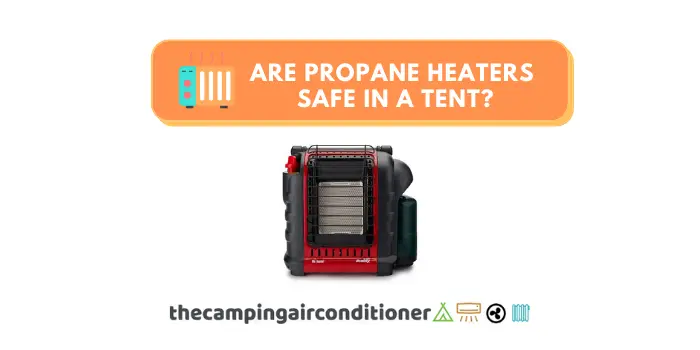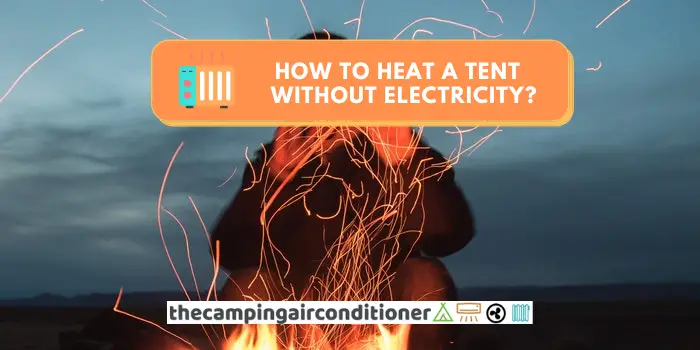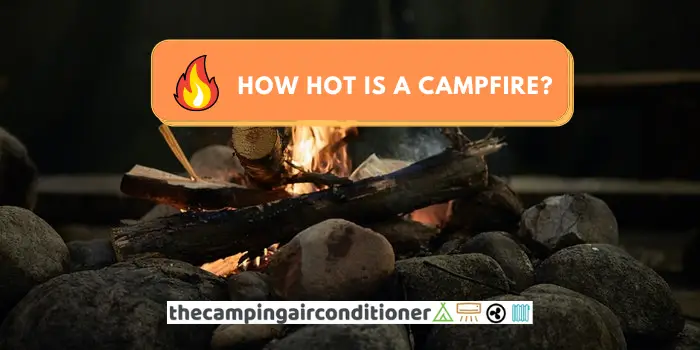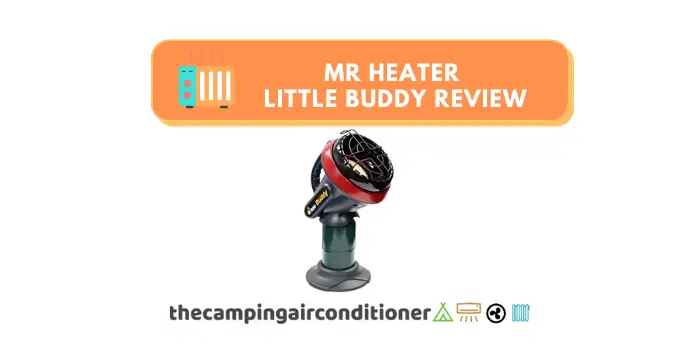Tent heaters are classified according to their power supply (gas heaters, electric heaters, kerosene, and others). As with everything in life, every heating alternative will have pros and cons. But what are the safe tent heater options available in the market?
We have undertaken a thorough investigation and concluded the following – electric heaters are the safest option – keep reading and we are going to explain why.
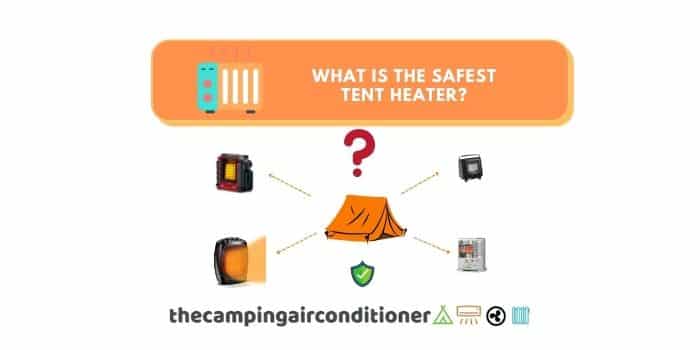
Why electric heaters are the safest option for a tent?
Because they do not release carbon monoxide(CO) or deplete oxygen levels, and as a consequence, there are no risks associated with CO poisoning.
However, this does not mean that they are entirely safe proof since you still have risks like overheating. In the next section, we detail the advantages and disadvantages of these devices.
Electric Tent Heater - Advantages and Disadvantages
Advantages of tent electric heaters
Do not produce carbon monoxide and do deplete oxygen levels
This is probably the main advantage concerning safety elements – Electric heaters do not release carbon monoxide or deplete oxygen levels when operating.
As the name says, the devices turn electricity into heat through diversified methods, such as infrared, convention, electric water heaters, and many others. All of these processes do not involve fossil combustion, and, therefore, there is no emission of CO and explosion risks.
Quick heat
Electrical heaters can reach high temperatures in a short timeframe and ensure that you have a cozy environment in minutes. Portable units are an excellent option to warm up your body during a freezing night inside a tent.
Be careful, though – you should not leave your heater unattended because of overheating risks – it can start a fire with it is around flammable objects.
Devices are affordable
Overall, devices are affordable with budget-friendly options for less than 30 dollars. Even though they are cheap, this equipment has good durability and might last for years if properly maintained.
Adjustable thermostats
Thermostats are dispositive embedded in electric heaters that allow you to control the desired temperature. Most of the devices come with advanced electronic dispositive that help you to regulate the temperature in your room or tent very quickly.
Disadvantages of tent electric heaters
Need for electricity input
This is the biggest concern of campers – lack of power input. Not every campsite will have a hookup available for your tent, and if they have, you might not be able to position your tent close to it.
Some campers use their solar-powered generators to run tent heaters. However, even the biggest stations might only be able to run small units (200W).
If you are considering this option, we recommend having a look at Jackery Solar Generator 1000 kit. It comes with a 1000W output and might work well with tiny heating units.
High energy consumption
As detailed above, these heaters need electricity in large amounts, making them impractical for camping at remote locations or campsites without hookups.
Small Devices
Because of power requirements, it is not feasible to have big portable units. Most transportable devices are small (up to 1500W or approximately 5000 BTU) and will provide enough heat to small to medium-sized tents.
If you are camping with your family, propane heaters might work better.
Recommended article: How many BTU do I need for a tent heater? (thecampingairconditioner.com)
Our recommendations - Electric Tent Heaters
We have prepared a detailed review of the below listed devices in another article – click here to read it).
Budget Friendly Option – Amazon Basics 1500W Oscillating Ceramic Heater
Best Overall – Dreo Space Heater (1500W) – Our choice
Heavy Duty Option – DuraHeat EUH1465 – 1500W
Best for backpackers and hikers – Compact Electric Heater – Lakso Heating Space Heater (200W)
Safe alternative to an electric tent heater
Propane heaters are cheaper than electric heaters and run at good efficiency levels. Furthermore, they do not need electric power to operate, ideal for campsites without electrical infrastructure.
However, as with other gas heaters, propane devices release carbon monoxide (CO) during their operations, potentially leading to severe poisoning.
CO levels under 70ppm (parts per million) are safe, and you should not worry at this stage. As levels go up, you might experience shortness of breath and nausea.
Above 150ppm, loss of orientation is likely to happen and intake for prolonged hours might be fatal.
If you decide to go with a propane device, ensure it has, at least, these safety mechanisms:
- Carbon monoxide detector (you can this item separately – look for battery-powered versions)
- Auto shutoff mechanisms for overheating detectors and tip over
- Oxygen depletion levels
- Pick equipment that complies with the American National Standards Institute requirements (ANSI Z21.103-2017)
Our recommendations - Propane Heaters
Lorem ipsum dolor sit amet, consectetur adipiscing elit. Ut elit tellus, luctus nec ullamcorper mattis, pulvinar dapibus leo.
Best option for backpackers, hikers, and small tents
Most efficient portable propane – best value for money (mid-sized tents)
FAQ
How many BTUs is 1 watt?
In short, 1 BTU equals 0.293W or 1 Watt equals 3.41BTU.
What heater size should I pick for my tent?
We wrote a specific article to help you choose the adequate heater size. We recommend applying the formula below:
(Temperature Increase) x (Tent Volume) x 0.25 = BTUs heater output.
Where:
- Tent Size – volume (area x height – in cubic feet)
- Desired temperature increase (in Fahrenheit degrees)
Is it safe to leave my electric tent heater on while sleeping?
No, we DO NOT recommend it. The device might overheat and start a fire if it has flammable objects nearby (including your tent).
What is best - an electric or a propane heater?
Both come with pros and cons.
In short, if you have an electric hookup option – do not hesitate to buy an electric model.
On the other hand, propane heaters are incredibly safe alternatives if you don’t have electric infrastructure around and follow the safety measures detailed by manufacturers.
Conclusion
Electric heaters are undoubtedly the safest option to warm up your cold nights when camping. However, the need for electrical power might hinder its use and make then an impractical alternative.
Propane heaters are a safe alternative and have evolved well over the last decades to ensure high safety standards.
Regardless of the chosen option, continuously monitor your tent overheating risks – polyester and nylon are not highly flammable, but once the melting process starts, it is difficult to control and might cause severe burns.








